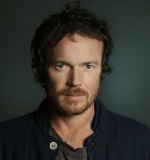Interview: Esquire (11 Nov 2014)
Posted on 11. Nov, 2014 by admin in Damien News, Interviews.
AMIEN RICE ON HIS TRIUMPHANT RETURN
After nearly a decade away, the musician talks about letting go of old negativity—and why we may see a lot more from him.
By Sarah Rowland on November 11, 2014
After eight years of silence, Damien Rice is more heartfelt and raw than ever on his new release, My Favorite Faded Fantasy, out this week. The past few years have undoubtedly been a growing period for the 40-year-old Irish musician, who now seems more relaxed and comfortable in his own skin. In conversation, he’s poetic and self-assured. His piercing blue eyes stare a moment too long, and he’s unafraid of thoughtful, silent pauses. Rice attributes his creative regeneration to letting go of outside expectations and old, lingering feelings that had infected his music. When we met up after he performed a show to launch the new album in London, Lisa Hannigan—Damien’s old partner in music and love—ironically started playing in the background. “That’s Lisa’s song on the radio,” he said. Then, with a quick smile, he was on to telling his next story.
ESQUIRE.COM: What was it like being gone for so long, and why did you do it?
DAMIEN RICE: For me it felt like I was just blinking my eyes. When you go to bed at night, you get seven or eight hours of sleep. I’ve had enough sleep. I’ve rested, and it’s as simple as that. I want to do it now. I didn’t want to three years ago. I was waiting until it felt right. I wanted to get back to falling in love with my guitar again, and hanging out with my guitar like I would a friend. I took a year off, and I thought that would do. But a year turned into two, and then three, so it just kept going. If I was to pin it down to something specific, I’d say that up until about three years ago, the songs I was writing still had lyrics or sentiments that didn’t match what I was feeling. It was old, negative energy coming out of me still, but it needed to all get out so I could trash those songs and put them in the bin. And then I was able to let the new songs out.
ESQ: So you’ve really had a kind of creative resurgence?
DR: Yeah, exactly. It’s like if you’ve had a massive meal and you’ve eaten just a little too much, and then you have a little too much desert, and then you drink a little too much afterward. You’re just finished! So I had to take a bit of a break and fast for a while, but then I found myself very, very hungry when I got back to it.
ESQ: You recorded the album in Iceland. What did you find there?
DR: Hot rivers! Lots of hot rivers. Even though it’s a slightly superficial thing to say, those experiences in nature really helped and refreshed me, you know? Being able to walk out of the studio after a week of intense recording and jump into a cold sea and sit in a hot spring and soak for a few hours completely resets the whole system. Really refreshing. For me, it’s all about stepping out of the ordinary. Even psychically. When I’m in a place like Iceland, I allow myself to take a little more time to divert off onto other paths creatively for a while and see what comes to me.
ESQ: What’s the story behind the title track?
DR: “My Favorite Faded Fantasy” was the only song actually written in the studio. Everything else had been prepared somewhere before, but that song came out of nowhere in the process. And it was the song that tied up the era that I’d been through. It felt like writing that song was releasing one era and moving into the next. It also came from this place where I really used to believe the things I was thinking, and now I really don’t believe them. There are lots of thoughts that happen and pop in the brain. I feel like I’m moving from a world where I was creating fantasies that weren’t real inside—and very often feeling really dissatisfied—to now living in reality for the first time in my life since I was a kid, and learning to appreciate where I am now while actually sitting with that reality.
ESQ: You’re known for a brutal honesty. How do you pull that out of yourself as an artist? Do you have to revisit painful experiences?
DR: Sometimes, yes. But mostly the sensation of writing is the same for me as taking a pee. There’s a signal within the body, and you know you have to go and do it. It’s physically necessary. The more you drink, the more you pee. For me, the more I live, the more I need to write. The more I push myself to really live and really experience things and step outside of my comfort zone, the more the songs are allowed to flow.
ESQ: So what’s next for you? Are you working on new material already?
DR: Yeah, I’m actually going back in the studio in January. I want to keep a thread between the studio and the stage, and I want to flow more easily from one to the other. Before, I made the record and then toured for years, and by the time I had gotten back into the studio, I had lost my studio fingers in a sense. It took time to relearn that, so I want to keep both very fluid now.





